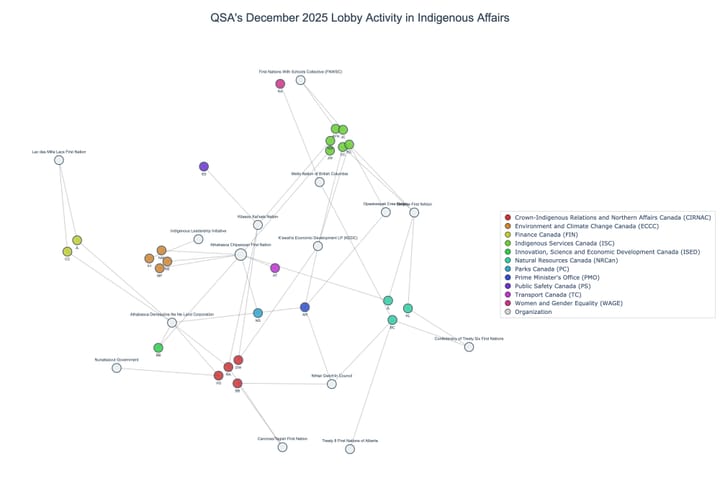QSA's Week in Indigenous Affairs (#24, 2025)
CRTC approves high-speed Internet funding for rural and Indigenous areas; Senate debates Bill C-5 and Indigenous rights; federal investments announced for Indigenous-led energy and climate projects; NAGPRA repatriation notices issued in US.

Good morning! This is Queen Street Analytics' weekly roundup of regulatory developments, legislative discussions, political announcements and other government-related news concerning Indigenous communities, First Nations, Inuit, and Métis, and their reserves, territories, and treaty rights. Every Monday, we break down the most important updates in this space in under five minutes.
Dates: 2025-06-15 to 2025-06-21
📋 In This Week's Newsletter
• 🇨🇦 Canadian Federal GR News
• 🗺️ Canadian Provincial GR News
• 📱 Public Officials' Social Media
• 📚 What We're Reading This Week
Canadian Federal GR News
CRTC Broadband Fund: Funding Announced for Rural and Indigenous High-Speed Internet Expansion
On June 19, the CRTC approved over $17 million through its Broadband Fund to expand high-speed fibre Internet to 18 rural communities across Alberta, British Columbia, and Ontario. Recipients include Minto Communications Society, County of Forty Mile No. 8, Vianet Inc., MCSnet, and Missing Link Internet Inc., with projects comprising approximately 330 kilometres of new transport fibre infrastructure. Notably, additional improvements to the fund are underway, and an Indigenous Stream is scheduled to launch later this year.
Sources: Announcements: www.canada.ca

Federal Investment in Indigenous-Led Solar Project in Yukon Targets Diesel Reduction
The federal government, the Government of Yukon, and First Kaska Utilities LP are jointly investing more than $28.6 million in the Sādę Solar Initiative near Watson Lake. The project will construct a 2.85MW solar power plant and a battery energy storage system connecting to the local micro-grid, which is currently diesel-powered. Located on the asserted traditional territory of the Liard First Nation, the initiative is expected to reduce diesel consumption for electricity by about 1,020,300 litres each year, cutting greenhouse gas emissions by 3,509 tonnes annually. The project is structured to proceed in two stages to maintain grid reliability, and is designed to create jobs, training opportunities, and revenue streams by enabling the sale of surplus electricity to the grid operator.
Sources: Announcements: www.canada.ca
Global Affairs Canada Announces $5.1 Million for Indigenous-Led Climate Projects Abroad
On National Indigenous Peoples Day, Global Affairs Canada allocated $5.1 million over two years to support three Indigenous-led climate resilience initiatives in South America, Africa, and the Indo-Pacific region. The Assembly of First Nations will partner with Asian Indigenous communities to develop climate solutions and biodiversity strategies.
Sources: Announcements: www.canada.ca
Senate Debate: Bill C-5 and Indigenous Rights Provisions
The Senate considered Bill C-5, which would enact the Free Trade and Labour Mobility in Canada Act and the Building Canada Act. Ministers Dominic LeBlanc and Rebecca Alty emphasized the bill’s urgency and provisions supporting expedited infrastructure and Indigenous participation. Senators and witnesses raised questions about exemptions from parliamentary scrutiny, the possibility of weakened environmental protections, and lack of mandatory Indigenous consultation.
Sources: Transcripts: senparlvu.parl.gc.ca
Senate Committee Examines Federal Budget Allocations for Indigenous Priorities
The Standing Senate Committee on National Finance, under Senator Claude Carignan, continued studying government spending estimates, hearing from Parliamentary Budget Officer Yves Giroux. The current expenditure plan is $486.9 billion, with notable allocations for health transfers, elder benefits, and debt servicing. Questions were raised about the deficit projected at $45-$50 billion for the preceding year, the use of external consultants, and the lack of a spring budget. Senators also sought clarity on the audit of special warrants, contingent liabilities related to Indigenous claims, and the efficiency of government spending in key areas, including Indigenous reconciliation. Senator Marshall specifically addressed contingent liabilities tied to Indigenous land and treaty claims.
Sources: Transcripts: senparlvu.parl.gc.ca
CRTC Outlines Modernization of Broadcasting Frameworks with Emphasis on Indigenous Content
In a June 18 address, CRTC Commissioner Nirmala Naidoo described ongoing proceedings aimed at modernizing Canada's broadcasting framework following the adoption of the Online Streaming Act. Current priorities include reducing the regulatory burden on radio stations and refining the definition of Canadian content for audio services, with specific consultations including French-speaking, Indigenous, and official language-minority communities.
Sources: Announcements: www.canada.ca
Federal Funding for Flood Mapping Projects Includes Indigenous Knowledge Exchange
The Government of Canada announced $6.8 million for 20 flood hazard identification and mapping projects, with $3.3 million directed to research institutes and $2.8 million to regional flood modeling. Natural Resources Canada is allocating an additional $750,000 for three projects that support the integration of Indigenous Traditional Knowledge with scientific practices for flood hazard mapping.
Sources: Announcements: www.canada.ca
Federal Ministers Issue Joint Statement on National Indigenous Peoples Day
On June 21, Ministers Steven Guilbeault, Rebecca Alty, Mandy Gull-Masty, and Rebecca Chartrand issued a statement marking National Indigenous Peoples Day. The ministers called attention to the significance of Indigenous leadership, languages, and cultural practices. The statement recognized the importance of Indigenous economic equity and the government's commitment to partnership and supporting Indigenous participation in economic opportunities. The message, available in eight Indigenous languages, is part of the government’s broader outreach during National Indigenous History Month.
Sources: Announcements: www.canada.ca
Samuel De Champlain Bridge Illuminated to Mark National Indigenous Peoples Day
The Samuel De Champlain Bridge in Montreal was scheduled to be illuminated in yellow, blue, green, orange, and pink on June 21. This public infrastructure commemoration was designed to mark National Indigenous Peoples Day and coincided with ongoing government activities and celebrations dedicated to First Nations, Inuit, and Métis cultural recognition.
Sources: Announcements: www.canada.ca
Canadian Provincial GR News
BC Secures Consent-Based Negotiation Mandate for Tŝilhqot’in Mining Projects
The British Columbia government obtained approval to negotiate consent-based decision-making with the Tŝilhqot’in Nation regarding mining projects in the Teẑtan Area, pursuant to the Declaration on the Rights of Indigenous Peoples Act.
Sources: Provincial Announcement: news.gov.bc.ca
Nova Scotia Awards Funding to Wasoqopa’q First Nation Under Lighthouse Project
The province awarded $400,000 to Wasoqopa’q First Nation to develop community structures supporting traditional Mi’kmaw teachings in food sourcing and mental resilience, with support from the Nova Scotia Lighthouse Project.
Sources: Provincial Announcement: news.novascotia.ca
Manitoba and Alberta Ministers Recognize National Indigenous Peoples Day
Manitoba Premier Wab Kinew and Alberta Indigenous Relations Minister Rajan Sawhney issued statements marking National Indigenous Peoples Day, inviting the public to join cultural events and learn about Indigenous contributions and histories.
Sources: Provincial Announcement: news.gov.mb.ca, Provincial Announcement: www.alberta.ca
Public Officials' Social Media
MP Brad Redekopp shared on social media his visit to the Métis Nation BBQ and Rock Your Roots event ahead of National Indigenous Peoples Day.
Sources: Social Media: x.com
MP Leah Gazan posted that Bill C-5 violates Bill C-15 and the United Nations Declaration on the Rights of Indigenous Peoples, raising concerns about the sufficiency of consultation.
Sources: Social Media: x.com
Senator Kim Pate used social media to note that Bill C-5 would allow Cabinet to bypass consultation with First Nations, Inuit, and Métis leaders, stating it undermines statutory rights.
Sources: Social Media: x.com
MP Patrick Weiler posted information about local events planned in recognition of National Indigenous Peoples Day.
Sources: Social Media: x.com
What We're Reading This Week
- Indigenous Peoples Day marked across Canada with hundreds of events: Ceremonies and activities held nationwide to commemorate National Indigenous Peoples Day.
- House approves Bill C-5 to fast-track projects, Carney pledges summer consultations with Indigenous leaders: Legislative passage of Bill C-5 coupled with promises for further engagement with Indigenous groups.
- Manitoba wildfire impacts on First Nations prompt calls for environmental justice: Report details the effects of current wildfires on First Nations and related advocacy.
- First Nations are mired in 'soft communism.' This leader has the fix: Coverage of governance debates related to economic models on reserve.

